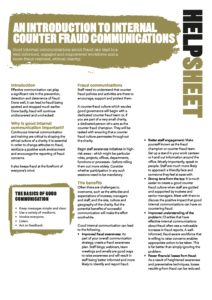Good internal communications about fraud can lead to a well-informed, engaged and empowered workforce and a more fraud-resilient, ethical charity.
Introduction
Effective communication can play a significant role in the prevention, detection and deterrence of fraud. Done well, it can lead to fraud being spotted and stopped much earlier. Done badly, fraud will continue undiscovered and unchecked.
Why is good internal communication important?
Continuous internal communication and training are critical to shaping the ethical culture of a charity. It is essential in order to change attitudes to fraud, reinforce a positive work environment and encourage the reporting of fraud concerns.
It also keeps fraud at the forefront of everyone’s mind.
Fraud communications
Staff need to understand that counter fraud policies and activities are there to encourage, support and protect them.
A counter-fraud culture which exudes good governance will begin with a dedicated counter fraud team or, if you are part of a very small charity, a dedicated person who acts as the counter fraud champion. They will be tasked with ensuring that a counter fraud culture permeates throughout the charity.
Begin staff awareness initiatives in high- risk areas – which might be particular roles, projects, offices, departments, functions or processes – before rolling them out more widely. Consider whether participation in any such sessions need to be mandatory.
The benefits
Often there are challenges to overcome, such as the attitudes and expectations of trustees, managers and staff; and the size, culture and geography of the charity. But the potential benefits of successful communication will make the effort worthwhile.
Good internal communication can lead to the following.
- Improved fraud awareness: As part of your overall communication strategy, create a fraud awareness plan. Staff blogs, webinars, team meetings and emails are good ways to raise awareness and will result in staff being better informed and more likely to identify and report fraud.
- Better staff engagement: Make yourself known as the fraud champion or counter fraud team. Set up a stand in your work canteen or hand out information around the office. Mostly importantly, speak to people. Staff are much more likely to approach a friendly face and someone they feel at ease with.
- Strong tone from the top: It is much easier to create a good counter fraud culture when staff are guided and supported by trustees and senior managers. Meet with them to discuss the positive impact that good internal communications can have on countering fraud.
- Improved understanding of the problem: Charities that have effective internal communications about fraud often see a noticeable increase in fraud reports. A well- informed, fraud-aware workforce that is willing to raise concerns enables appropriate action to be taken. This is far better than simply ignoring the problem.
- Fewer financial losses from fraud: As a result of heightened awareness and preventative techniques, losses resulting from fraud can be reduced.
The basics of good communication
- Keep messages simple and clear.
- Use a variety of mediums.
- Involve everyone.
- Listen.
- Act on feedback.
Five steps to get started
-
Identify your key messages: Set out the counter fraud messages you want to share with your staff and how you will do this. Work with other key internal stakeholders, such as human resources, governance and finance. Use their expertise to assist with proactive exercises, interpreting the results and identifying potential areas of concern.
-
Adopt a ‘little and often’ approach: Drip-feed your fraud messages to staff on a regular and continuous basis to maintain heightened awareness levels.
-
Use a variety of mediums: Use different ways to engage with staff and get your messages across: posters, videos, awareness days, training session (self-study and instructor led), quizzes, intranet pages, fraud alerts, staff newsletters and case studies. Also consider taking part in sector-wide initiatives like charity fraud awareness week.
-
Keep it simple and accessible: Keep your messages clear and simple. Fraud reporting mechanisms need to be accessible and easy to use by everyone regardless of where they are based. Ensure the details of your counter fraud champion or team (if you have one) are well publicised to staff throughout the charity.
-
Monitor effectiveness: Assess your communications using tools such as staff fraud awareness surveys and informal feedback. The results will alert you to any changes that may be needed and help inform future work.
Checklist
BUILDING YOUR CHARITY’S DEFENCES
Ask yourself:
- Do we have a counter fraud champion or team that leads our work in this area?
- Have we spoken to our internal communications person (or team) about the best ways to share counter fraud messages with staff?
- Do we have a counter fraud internal communications plan?
- Are our counter-fraud policies and processes communicated effectively to all of our staff and volunteers at the point of recruitment and at regular intervals during their service?
- How do we measure the success of our communications and have we got a plan for making improvements?
- What training and support do we provide for our staff, and how often do we refresh this?
Other resources
Preventing Charity Fraud contains resources to help charities prevent, detect and respond to fraud.
ACKNOWLEDGEMENT
This helpsheet was kindly prepared by Jessica Lightowler from the British Council.
DISCLAIMER
Published 2019. Last updated August 2021.
© Fraud Advisory Panel and Charity Commission for England and Wales 2019, 2021. Fraud Advisory Panel and Charity Commission for England and Wales will not be liable for any reliance you place on the information in this material. You should seek independent advice.
This work is licensed under a Creative Commons Attribution-NonCommercial-NoDerivatives 4.0 International License.
